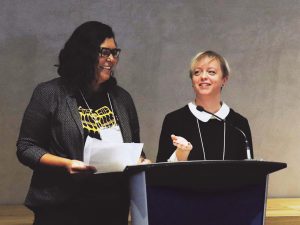
Manitobans are being asked to voluntarily declare their race, ethnicity or Indigenous identity when they receive care at hospitals.
The province is the first in Canada to systematically collect this information from patients when they access care. The purpose of amassing and analyzing the data is to address racial inequities in health care.
The initiative, launched in May, is led on behalf of Shared Health by Dr. Marcia Anderson, vice-dean Indigenous health, social justice and anti-racism of UM’s Rady Faculty of Health Sciences.
“The only reason to collect racial, ethnic and Indigenous identifiers in data is so that we can measure how systemic racism is happening in health care, intervene, and then check to make sure that our interventions are actually making a difference,” said Anderson.
Countries such as the United States, Australia and England collect racial identifiers as part of health data, and after significant advocacy from Black and Indigenous health experts and communities, Canada is now recognizing the need for this kind of information, Anderson said.
Plans for the initiative were jointly announced on Feb. 2 by UM, Shared Health and the province.
That morning, Ongomiizwin, the Indigenous Institute of Health and Healing in the Rady Faculty, and the UM-based George & Fay Yee Centre for Healthcare Innovation – also a partner in the initiative– hosted a discussion of community-owned, race-based health data at the Canadian Museum for Human Rights.
“As a health system … we are trying to take critical steps to disrupt racism and discrimination in all forms,” Monika Warren, chief operating officer of provincially co-ordinated health services at Shared Health, said at the event.
Patients at hospitals, including emergency rooms, will routinely be asked to self-identify during registration by choosing from a list of Indigenous, racial and ethnic identities.
The key point made by speakers and panelists at the event was that BIPOC (Black, Indigenous, People of Colour) communities must have governance over the use and release of the data.
Because there is a risk of race-based data being misused to cause harm, speakers said, transparent governance agreements must be maintained between the health system and BIPOC communities. The data must be collected in a culturally safe way and must only be used to advance health equity.
Anderson and Dr. Jillian Waruk, senior epidemiologist with the Government of Manitoba, gave a presentation showing that when Manitoba started collecting voluntary race-based identifiers in the spring of 2020, the data quickly exposed the disproportionate effects of COVID-19 on BIPOC communities. This knowledge allowed for targeted efforts, such as improved vaccine access, that saved lives.
The collection of the data was widely accepted, Anderson noted, with fewer than two per cent of patients declining to declare their identity.
At the event, an audience member commented, “We’ve been data-collected to death” and questioned whether the initiative would lead to improved health care for First Nations.
Anderson agreed that the project must lead to “concrete, deliberate action.”
“Data collection … is not the end of the line,” she said. “It’s the starting point of an intervention.”
BY ALISON MAYES
